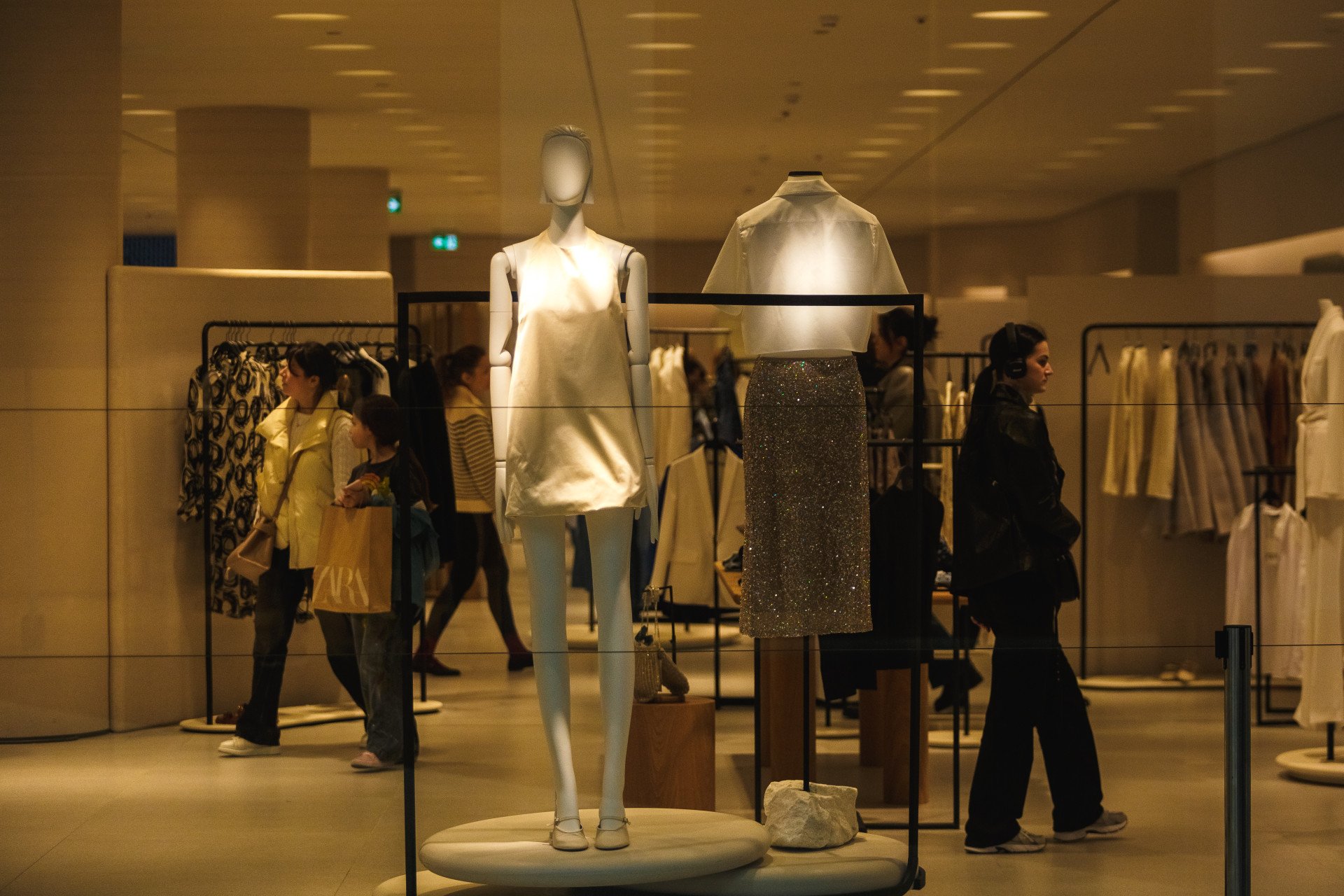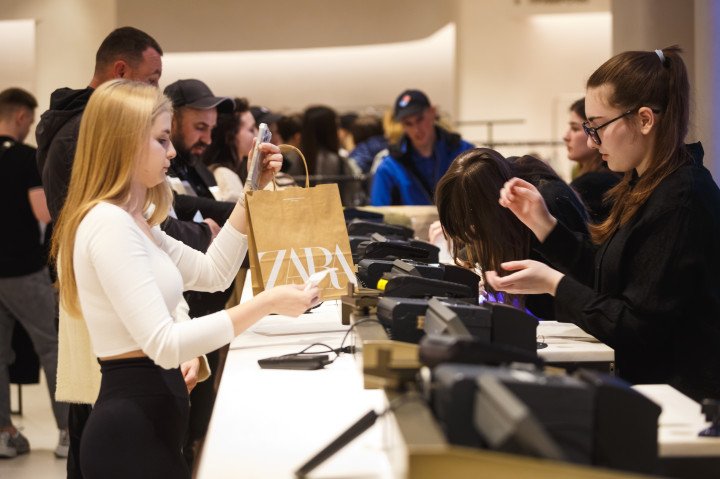- Category
- Business
Which Global Brands Have Made a Comeback in Ukraine?

After closing during the chaos of Russia’s full-scale invasion in 2022, many international brands are reopening in Ukraine. Which ones have returned, and how are they navigating the challenges of operating during wartime?
Restarting operations in Ukraine has required companies to rebuild logistics, adapt business strategies, and prioritize employee safety–which takes some planning. Thanks to efforts by the Ukrainian Foreign Ministry and the resilience of the local workforce, global brands are reopening their doors on the Ukrainian market, despite threats of Russian bombardment.
It’s strange to celebrate eating McDonald’s, but in Ukraine its reopening is a symbol that victory is ever closer. McD’s has been closed since Feb & some stores are now back in Kyiv and Lviv. The lines are long & check out all the delivery drivers! But the fries are worth it. 🍟 pic.twitter.com/U3UdmUPvfB
— Nate Mook (@natemook) October 27, 2022
Which brands are back in Ukraine?
McDonald’s
Leading fast-food brand, McDonald’s, resumed operations in Ukraine in September 2022 and their trading has been noted as a symbol of Ukrainian resilience. From April 2022, as Russian forces were pushed back from Kyiv, McDonald’s workers were keen to resume working as customers wanted their normal lives back. Careful preparations were needed to ensure the safety of staff which reflected the unprecedented security situation during wartime.
A “practical crisis manual” was created to address unforeseen challenges that arose during the initial invasion. The manual is a step-by-step guide to support staff through major crises during wartime. It is based on Ukraine’s unique experience but is available to McDonald’s teams internationally. Though basic measures were in place before the full-scale invasion, there was a wide range of unexpected practical issues that arose.
During the initial evacuation, for example, some managers took the keys with them as they fled to other parts of Ukraine, some even leaving the country entirely. “We now have a very detailed step-by-step guide to dealing with major crises,” the Managing Director of McDonald’s in Ukraine said. “Unfortunately, it is a work in progress and is still being regularly updated.”
I just want the people who were all pissy last week about Kyivans going to McDonald's to know that not only is McDonald's open in Kyiv, but that they'll make you a Big Mac at 6 AM. pic.twitter.com/EErKwbOOpc
— Joel Wasserman (@joelw_762) June 5, 2023
JYSK
Like McDonalds, the Danish home furnishing retailer, JYSK, was quick to resume operations, opening its doors again as early as March 2022. Since resumption, JYSK opened 20 new stores, upgraded 17 existing, and rebuilt 6 stores damaged or destroyed by Russian bombs.
In March 2022 they left Russia permanently due to their invasion of Ukraine. Seventy of their employees have been drafted to fight against Russian forces. JYSK, like many other companies, continues to pay their staff wages. They’ve also supported employees by supplying furnishing for those who have lost their homes due to the war.
JYSK celebrated 20 years of trading in Ukraine by opening their 100th store in Chernivtsi, and their 101st in Odesa, November 2024.
“We believe that there is a bright future for Ukraine, and we want to do our part to rebuild the country and ensure job opportunities,” said Rami Jensen, President and CEO of JYSK. “We look forward to being able to celebrate with our colleagues after the war and we continue to support them and their plans for further expansion.”
#JYSK, the international home furnishing retailerchain, has opened a new store in the Rodos shopping center in #Odesa. The new store became the chain’s 101st retail outlet in #Ukraine, which celebrated 20 years on the Ukrainian market in October. pic.twitter.com/u4RO8PiIpi
— Ukraine Business News (@theUBN) November 25, 2024
Inditex
Leading international brands belonging to the Spanish parent company, Inditex, one of the world's largest fashion distribution groups—Zara, Pull&Bear, Massimo Dutti, Bershka, Stradivarius, Oysho and Zara Home re-opened their doors this year, in April 2024.
Kyiv shopping centers saw four Zara, six Pull&Bear, and seven Bershka stores reopened. Most of the reopened stores are in Lavina Mall, Respublika Park, Sky Mall, and Dream Town.

H&M and IKEA
Swedish fashion giant H&M re-opened in November 2023. IKEA announced in July 2024 that it will resume operations in Ukraine following H&M and the Inditex brands. There is no set date yet, but plans are underway.
“The return and success of H&M was an important signal for the head office of IKEA, and they also closely followed the recovery of Inditex,” according to Forbes Ukraine’s sources.
IKEA suspended operations in Russia in March 2022 and completely withdrew from the Russian market in 2023.
Challenges of trading in war
The most important challenge that international businesses face is ensuring the security of customers and employees. Resuming operations can take time while sufficient plans are put into place. Other issues that businesses face during wartime trading are blockades of trade routes like seaports and land crossings, fuel deficits, increased lead times, increased logistics costs, and energy supply disruptions.
However, international brands have persevered and their success highlights Ukraine’s resilience. Returning international brands is a statement to the world that Ukraine is not defeated, and is a worthwhile country to trade in.
To everyone who had a problem with that video of McDonalds in Kyiv, Ukraine: How’s this for peaceful life and fake war?
— UNITED24 Media (@United24media) May 29, 2023
People hiding in the Kyiv metro on a Monday morning from Russia’s missile attack. pic.twitter.com/bBzMJzdR7x
International business grows in Ukraine
Over 100 countries brought business to Ukraine as of May 2024, creating more than 2,600 new companies during the full-scale war, according to the Opendatabot monitoring platform.
The apparel market has an expected annual growth rate of 7.01% per year, the largest segment is women’s apparel. Aside from international brands, statistics indicate a “surge in demand for traditional embroidered clothing, reflecting a renewed interest in national heritage and cultural identity.”
The vyshyvanka is a traditional Ukrainian shirt, embroidered and made with white linen. It’s believed to have the “power to protect a person from all harm and bring good luck.” Embroidery varies depending on the region, even villages have their own versions, each with varied meanings, unique patterns, and techniques.
"If someone tries to take something that belongs to you, you'd probably start to think of it as more special, and try to protect it," 28-year-old Kyiv resident Liudmyla Kravchenko told reporters. "Right now, Russia is trying to steal our identity. And what is our identity? The vyshyvanka."
The vyshyvanka symbolizes being Ukrainian, fighting for freedom and democracy.
14 #Vyshyvankas. A combination of ancient Ukrainian patterns and special nods to each U24 ambassador. Traditions and the present.
— UNITED24 (@U24_gov_ua) May 31, 2023
You can win each of these by donating $24+ towards a school reconstruction in Buzova, Ukraine.
Only two more days left:https://t.co/pIzGQoE4mK pic.twitter.com/ppQIX2FjHd
-46f6afa2f66d31ff3df8ea1a8f5524ec.jpg)
-270e13af43760897c8cb3e7f3ee9adf1.png)

-b63fc610dd4af1b737643522d6baf184.jpg)

-099180a164f53abb1128c9b5025a2b0e.jpg)
-4390b3efd5ecfe59eeed3643ea284dd2.png)